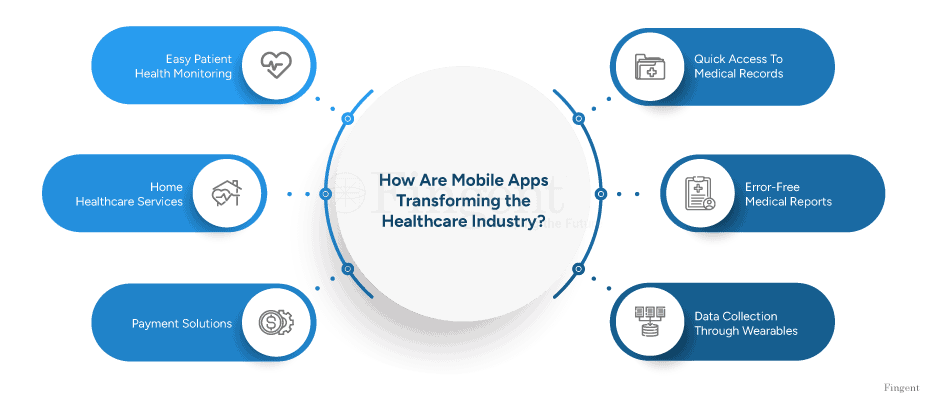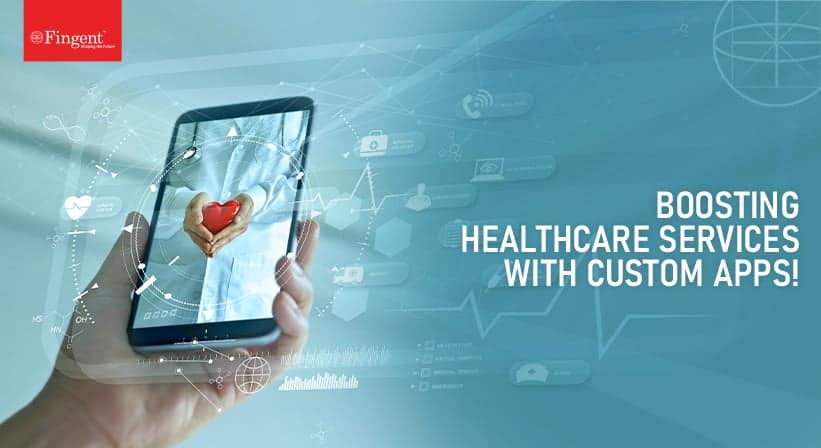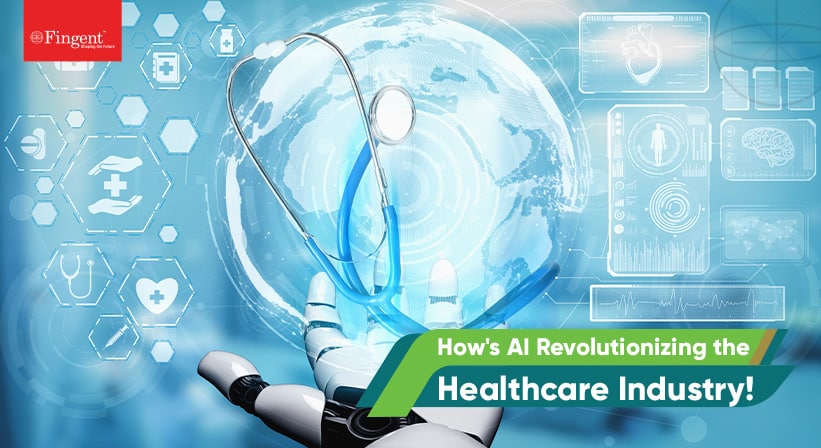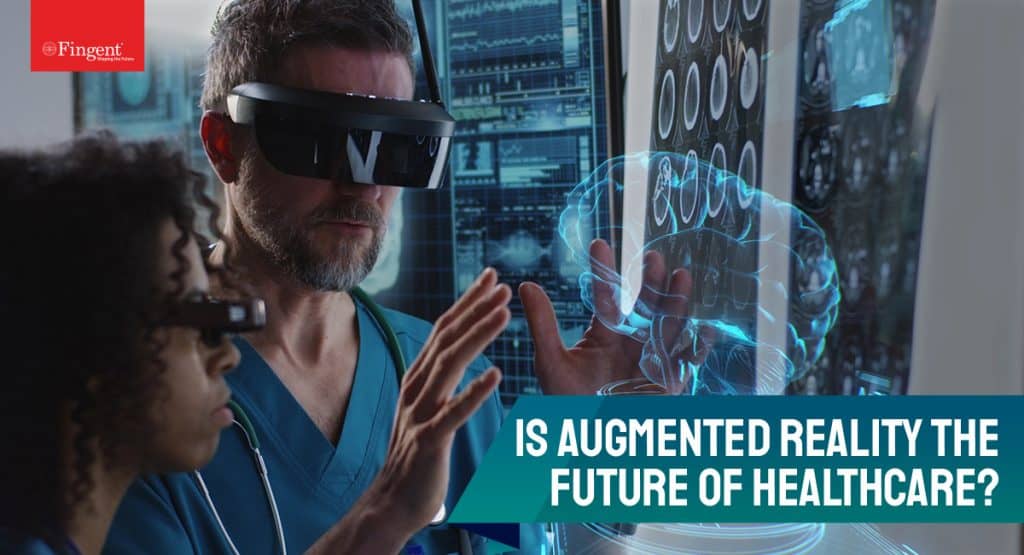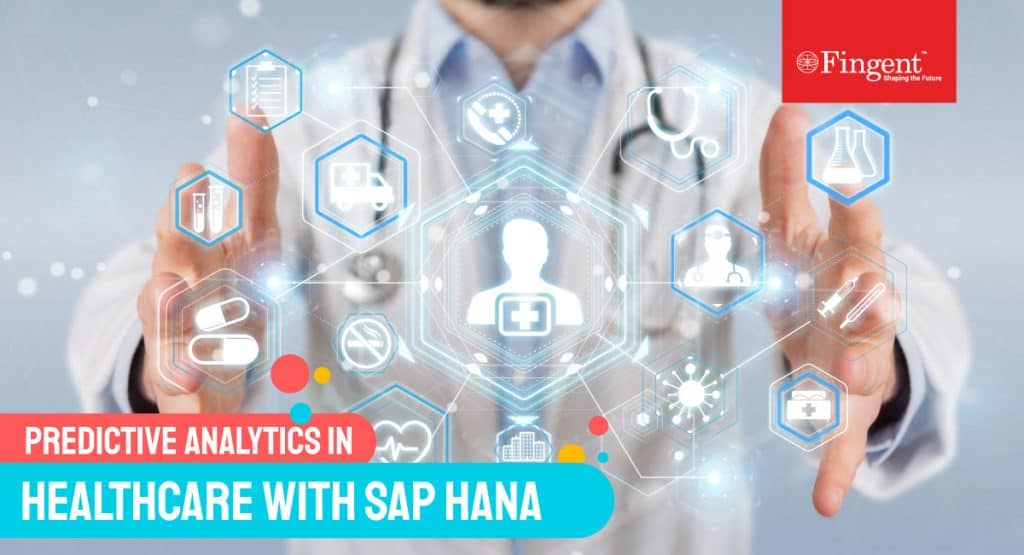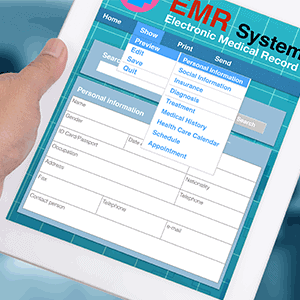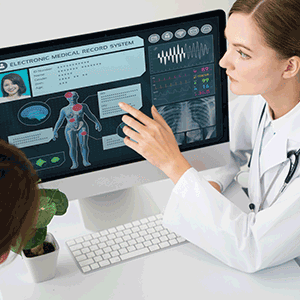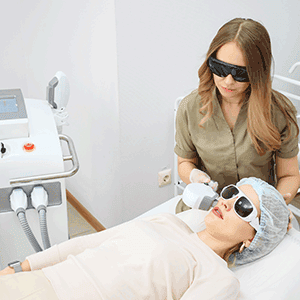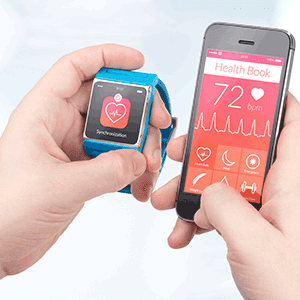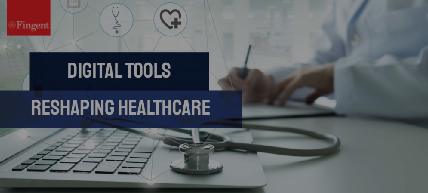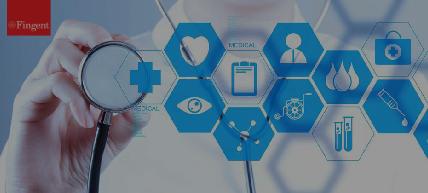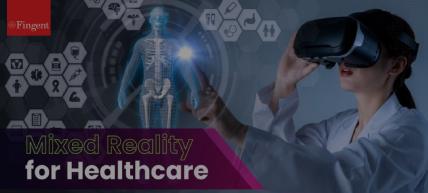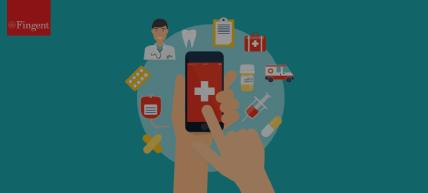Tag: healthcare technology
There was a time when sifting through piles of paper-based medical records was an everyday task for healthcare professionals. Today, however, healthcare technology has simplified processes, making them more effective, streamlined, and accessible. Mobile applications, in particular, are equipping both healthcare professionals and patients equally to connect effectively and execute better treatments and facilities. From telemedicine to remote monitoring, instant diagnosis, and easy access to patient data, healthcare technology and mobile apps are paving the way for revolutionized patient care and healthcare services. What does the future of healthcare technology look like, and how much is it impacting the domain now? Find all that and more in this 3-minute read!
Build Custom Healthcare Technology Solutions
That Caters To Your Unique Challenges & Boosts Patientcare Services.
What Is Mobile Healthcare Technology?
Healthcare mobile applications include any applications related to ensuring people’s health and wellness. These apps can be built to serve different purposes. The most popular of them are fitness apps, which again might be categorized with functionalities that are subjected to exercises, weight, or diet management. Almost 3 in 10 adults report using at least one health app on their smartphone.
Medical applications built for hospitals, on the other hand, ease booking consultations and simplify doctor-patient collaboration. Medical applications can also be specifically designed for clinical and medical purposes. These equip healthcare professionals to access the right data, diagnose faster, track health conditions in real time, and provide personalized healthcare services.
Custom healthcare software development whereas, is the process of creating a progressive application that caters to the specific needs of an organization. There are two key factors that determine this development:
- For healthcare professionals to check and track their patients’ health. It can also include managing staff administration, appointment scheduling, etc.
- Patients can use the app to manage their health. They can also receive medical advice and book appointments.
Studies show that investors’ funding in the digital health industry amounted to almost 45 billion U.S. dollars in 2021! Clearly, the market for healthcare mobile apps has shown much growth and opportunity.
Why Mobile Applications Are Important in Healthcare?
The healthcare industry has seen many benefits thanks to healthcare technology and mobile apps, from emergency responses to treatment monitoring and direct communication with diagnosed patients. These apps can provide many tools to assist the hospital and patients. They also help improve efficiency in emergency management by alerting first responders automatically. These applications can optimize even the administration department of a healthcare center. They assist with tasks like record maintenance, documentation, clinical decision-making, and information management. Listed below are some of the revolutionized aspects of healthcare:
1. Health Monitoring of Patients
Patients can monitor their health through fitness bands and wearables, which connect to their smartphones and tablets. These can help track daily activities such as walking, sleep patterns, and dietary habits. This development has shifted the world of healthcare professionals and patients. It automates tasks like record maintenance and provides real-time access to health records.
Read more: Information Technology in Healthcare: Applications and Role
2. Home Healthcare Services
These services can calculate medication intake, monitor medical equipment, and meet other requirements. With these applications, patients can choose to receive at-home care in real-time. This is vital for patients with special needs who can’t regularly visit hospitals. These patients can range from senior citizens to people with mental and physical disabilities.
3. Payment Solutions
The development of medical applications has facilitated seamless payment processes. Patients can make bill payments without waiting for hours in the medical institute. With optimized payment solutions, they can safely make payments in an instant.
4. Medical Records
This is another widespread transformation medical apps bring to the healthcare industry. With these apps, doctors and patients can maintain medical records on the cloud. Here, they are not at risk of being misplaced or corrupted. Recording medical reports also helps doctors make quick medical decisions during emergencies.
5. Medical Reports
Healthcare professionals need to be accurate in what they do. Any errors made by them can cost lives. Medical errors mostly occur in diagnosis or oversight of previous medical reports. Fortunately, these instances have decreased since the integration of technology in healthcare, such as artificial intelligence for diagnosis. AI, such as machine learning and data analytics, provide accurate reports that support doctors in treatment. Quick access to patient reports on mobile devices also helps save time and make timely and accurate decisions.
6. Data Collection Through Wearables
Wearables such as pedometers can be integrated with mobile app development. This can help them track and automatically record health-based data in real-time. These apps will gather daily patient health data from their wearables and store it in a dataset. Later, this dataset can be used to track health progression or regression.
What Are the Benefits of Mobile Devices in Healthcare?
Medical app development can benefit both the hospital and patients. The advantages are innumerable. Listed below are some of the advantages that hospitals and patients gain.
For Healthcare Professionals:
1. Efficient Patient Management
Medical apps can provide real-time updates and notifications to medical staff. This will ensure that they cater to patient needs with accuracy. It also reduces the time spent waiting for updates. Patient data can be uploaded to the software cloud in real time. It can be accessed by any medical professional from here. This centralized access to patients helps professionals make quick decisions. All these features enhance the efficiency of the organization.
2. Time-saving Communication
In the field of medicine, communication is life-altering. Healthcare professionals’ collaboration and coordination must be flawless. Mobile apps allow professionals to communicate with each other. This way, they can share critical patient information. Electronic health records (EHR) systems also provide secure messaging chatrooms. Here, patients can confide in medical staff without fear of privacy breaches. These systems also help staff access patient data from mobile devices. Any changes in patient status will be altered for stakeholders through these apps. This ensures that treatment plans, administrative tasks, and crucial decision-making are prompt and cohesive.
3. Reduced Costs
Streamlining processes with the help of healthcare technology cuts down operational costs. It eliminates the need and risks of manual labor. Thus, optimizing resource use leads to cost efficacy. Some other financial benefits are reduced labor costs and administrative expenses. Accurate diagnosis with mobile application AI can also save organizations from costly lawsuits. They also optimize resource allocation and identify cost-saving opportunities.
4. Streamline Administrative Tasks
An integral benefit of mobile apps in healthcare is the streamlining of tasks. Through digital documentation, they mitigate the risk of errors in manual data entry. These applications can automate various mundane tasks and optimize them. From scheduling appointments to accessing previous medical records, these apps improve operational efficiency.
5. Cut Risk of Misdiagnosis
This is the most important benefit of mobile apps in healthcare. Data Analytics helps healthcare professionals evade the risk of misdiagnosis. Health apps can also nullify any challenges leading to inadequacy in treatment. These apps can store and retrieve reports of patient’s health conditions in real time. This ensures that doctors prescribe accurate medicines and treatment options.
For Patients:
1. Access to Medical Records
Patients like to be kept in the loop about their treatment. Medical apps allow them to access and understand their diagnosis. They can feel proactive and in charge through educational videos and health articles. These applications also provide interactive features like virtual tours, which help reduce anxiety and enhance patient comfort.
2. Remote Consultations
A well-appreciated feature of mobile apps is their remote consultation feature. This feature allows users to consult doctors at any time from anywhere and view medical records from their online consultations at home, promoting accessibility and convenience.
3. Health Monitoring and Lifestyle Tips
Mobile applications can be connected with wearables and gadgets to track health conditions. These apps can alert the user when there are fluctuations. They can also schedule appointments and connect to care providers hassle-free. Some mobile applications also provide educational tips for improving lifestyle. Patients can also access chatbots that will answer their questions for minor issues. This adds another layer of efficiency to mobile apps.
4. Easy Appointment Management
Scheduling appointments is a hectic process. Some people avoid visiting the hospital due to this hassle. Medical mobile apps mitigate this challenge. With its digital support, anyone can connect to many doctors and book appointments. They can also browse the professional’s profile and add filters for personalization. For regular patients, they can add a feature to update their appointments consistently. The app further optimizes communication and sends appointment reminders. They also provide options to cancel or reschedule appointments with ease.
5. Hassle-free Payment
Through secure payment portals, patients can make quick transactions. This way, they are saved from waiting in long lines for hours to make one payment. The payment systems also guarantee security and confidentiality. Users can also personalize payment methods, pay online, and contact insurers.
How Is AI In Healthcare Enhancing Patient Outcomes and Experience?
What Is The Future of Mobile Health Apps?
As mentioned earlier, healthcare technology and mobile apps will continue to progress with technology. This is one of the rare certainties of the world. Recently, Grand View Research conducted a study to determine the growth of technology in healthcare. They concluded that by 2030, the mHealth apps market size will grow at a CAGR of 17.7% to reach $86 million.
Artificial intelligence has already been incorporated into healthcare industries to solve various challenges. This collaboration is expected to grow further with the advancement of AI-driven applications. These apps can analyze data for early detection and provide virtual assistance. With this integration, the possibilities of healthcare app development are endless.
How Can Fingent Help Build and Find Opportunities with Healthcare Apps?
At Fingent, we build applications with intricate customization. Our healthcare clients have found operational efficiency, ease of collaboration, and process automation with our tailored healthcare technology solutions. One such example is our collaboration with NovitaCare, an early-stage healthcare startup in the US. The client wanted to improve engagement with their stakeholders and create better patient outcomes. We helped them develop a Healthcare Service Platform for their clientele that eased administration, optimized workflows, and streamlined HIPPA compliance.
Another example is the invoice and expense claim management system that we designed for MundiPharma, a leading pharmaceutical company with over 50 years of experience in the field. The application helped them streamline the payment process, issue invoices, and maintain operational transparency with intuitive dashboards.
Our professionals integrate emerging technologies to offer the best service. With our experts always having their finger on the pulse of technological developments, you can always stay one step ahead of the competition. With innovation backing your healthcare goals, we can pave your path to achieve excellence.
Connect with our experts today and discover innovative opportunities for your healthcare organization.
Stay up to date on what's new

Featured Blogs
Stay up to date on
what's new



Talk To Our Experts
The world of technology keeps evolving and waits for no one, so it is our responsibility to keep up with it rather than fall behind. The healthcare industry has for a long time been using software development systems to monitor and ease work-lifestyles; now it is time to customize this software to make them function and run exactly the way you need it to. Custom software development has made life and business significantly easier for innumerable industries and is poised to revolutionize the Healthcare Industry as well. This article will tell you all you need to know about it.
Importance Of Healthcare Software Development
Healthcare software systems provide innumerable benefits to hospital management, from improved productivity to reduced medication errors. It streamlines the workflow, enhances data quality, drastically reduces errors, and boosts patient experiences. Rising technological advancements also help with hospital administration and operations.
Benefits Of Customized Healthcare Software Development
The overall benefit of using customized healthcare software is overall progress and betterment. This should be reason enough to convince anyone to adopt custom healthcare software but if it is not, listed below are a few of the other benefits of this type of software development:
- Increased security – Thanks to the inculcation of software in healthcare, hospitals are now sending, storing, and retrieving data through the web. Custom software solutions will guarantee the safety of this personal medical data.
- User-friendly experience – The target audience’s desired product is taken into consideration by software designers and user interface designers. Software designers can also consider specific aspects of an application to make it more alluring and interactive.
- Customizable features – Customization is the buzzword right now, and custom software provides it like no other. Customer feedback is prioritized, and the generated product is more streamlined and efficient. Customized software will handle specific problems, and this aspect makes it attracts and brings in more loyal customers or patients.
- Quality of diagnostics – Technology is well known for its brilliance in efficiency. Diagnostics run by a customized software solution have proven to have outstanding quality and accuracy because these solutions imbibe knowledge from innumerable sources and compare results faster. Hence, healthcare providers can proffer improved healthcare if they rely on custom software solutions.
Read more: How Can Custom-Made Software Provide Superior Customer Service In The Healthcare Industry?
Understanding Healthcare Software Development
Healthcare software development is the creation of any software for the healthcare sector to facilitate hospitals and improve equipment management. It also helps with administering electronic records, managing health records, providing diagnoses and treatments, improving patient care, and reducing costs.
Healthcare software development plays an important role in everyone’s life. For doctors – it reduces paperwork and increases collaboration with other specialists. For patients – it enhances patient outreach, improves healthcare quality, and eases access to medical data. Lastly, it improves medical business management and streamlines management processes for organizations.
Healthcare organizations, just like any other organization, have their own set of challenges that cripple them. Custom Software can address most of these challenges and fix them.
- Cyberthreats – The skyrocketing rate of cyber security attacks threatens to endanger the personal medical data of patients and, ultimately, the reputation of a healthcare center. Custom Software can fix this with its exceptional security firewalls and customized cyber security.
- Patient Experience – When patients experience favorable care, they are more likely to heed medical advice and this is essential for better healthcare outcomes, boosting patient retention rates and lowering malpractice risk. Custom software can help here, too by enhancing the user experience and user interface by creating more interactive, customized, and enticing products.
Key Considerations for Healthcare Software Development
Now that we have established the importance of custom healthcare software development, here are some key considerations:
1. Compliance And Security –
Medical records are very sensitive data, and it is the responsibility of the healthcare facility to protect them carefully. Abiding by the international security laws of HIPAA, PCI, and IOS is a must, along with deft investments in specialized medical data security. Ensure that your partner conducts adequate software checkups to detect any potential vulnerability.
2. User-Centred Design –
Customized healthcare software’s main target is its audience, so focusing on their comfort or ease is a top priority. Inclusivity of all kinds, from senior users to less literate users, is a crucial thing to keep in mind when designing an interface for the organization. Properly incorporated user-centered designs are vital for an intuitive and efficient workflow. Software Designers usually build a simple and easy-to-use user interface (UI) and a user experience (UX).
3. Interoperability and Integration –
Interoperability, in simple words, is the ability of a software or system to work compatibly with other products and systems. It helps facilitate organized and effective data exchange between data systems. To avoid complications with regard to personalized information or reports of customers while sharing data between systems, especially when introducing new versions of the same software to different platforms, efficient interoperability is important.
4. Scalability and Flexibility –
Scalability and flexibility are other critical considerations to remember. It is imperative to design a product capable of scaling up as your healthcare organization grows. Ensuring that your customized software developed is flexible and can change and segue according to wavering customer demands.
5. Data Analytics and Insights –
Data analytics is essentially the process of studying raw data in order to determine trends and enable enhanced decision-making. This transformation of data done by custom software into insights can drastically leverage data to enhance decision-making, patient outcomes, and overall operational efficiency.
Read more: AI in Healthcare – Know what’s trending and what’s upcoming!
Steps in Custom Healthcare Software Development
Let’s now get into the development itself. Here are some steps to ensure that the development goes smoothly and provides the best outcomes:
1. Requirements Gathering and Analysis –
It is always best to make a detailed analysis of your organization, its needs, and budgets before diving into a custom software development project. Consult well-versed software designers and healthcare professionals, jot the requirement details, and communicate with your team members to obtain an unbiased perspective.
2. Design and Development –
In this step, the analysis generated is used as input and software infrastructure for implementing software development. Software developers first draw a synopsis of the details for the application, including specific aspects such as User interfaces, System interfaces, Network and Network Requirements, and Databases.
Following close behind the design stage is the development stage. It is the stage where coding starts and all components of the software are implemented. The use of agile methodologies and interactive interfaces to improve user satisfaction, flexibility, and feedback incorporation is crucial during this phase of development.
3. Quality Assurance And Testing –
The testing period begins at the end of the coding stage. Here the modules are circulated for testing. Although testing may not seem like a necessary step, skipping it will ultimately result in the downfall of software. The developed software should be tested thoroughly, and developers fix any vulnerability discovered. There are various tests that need to be conducted after coding of software; these include – functional, usability, and security testing.
4. Deployment and Training –
After the product has been sufficiently tested, the software is deployed into the market or organization scheme. In the case of UAT (User Acceptance Testing), a production environment is created, and the customer, along with the developers, partakes in the testing.
Case Studies
Fingent has been a leader in custom software development for the healthcare sector and has created unmatched solutions for its clients. Here are a few examples:
A Data Analytics Solution for NHS: With the wide range of hospitals under its governance, the NHS required a data visualization tool that would help them compare healthcare performances across the hospitals and showcase the best ones. Fingent helped develop a solution that was customized to the NHS’s specific needs and designed an application with interactive visuals and real-time access to insights.
Fingent’s portfolio includes top-notch solutions like this, including an online engagement platform for NovitaCare and a patient care solution to promote effective communication in the healthcare ecosystem. Working with clients globally, Fingent has been able to have a direct impact on simplified patient care, operational efficiency, and cost savings for healthcare providers.
Future Trends In Healthcare Software Development
The future evidently holds great plans for healthcare software. We have only skimmed over the uses and possibilities that technology has introduced to healthcare; there are so many more possibilities.
1. AI in Healthcare
Artificial Intelligence is the most beneficial factor of technology for the healthcare industry. It can effortlessly mimic human cognition in analyzing, interpreting, and evaluating complex medical data. AI can perform data analysis through the healthcare system and can be widely used to predict patient admissions and improve clinical workflows.
2. IoT in Healthcare
IoT (Internet of Things) has the potential to enable healthcare professionals to supervise their patients more accurately. It can equip healthcare workers and professionals with the tools to deliver excellent care and treatment to patients. Exploiting this technology and several tech-powered wearables that enable real-time tracking, end-to-end connectivity, and remote monitoring are some of the other areas that IoT will assist.
Summary
Healthcare Software Development benefits institution staff, patients, and administrators. Although it might seem quite diverse and may come across as a daunting task, with the right partner on your side your journey will be successful.
Look for a partner in Fingent, and we will help you navigate the complexities and compliances that come with the development of healthcare software solutions.
Reach out to us today, and let’s get talking.
Stay up to date on what's new

Featured Blogs
Stay up to date on
what's new



Talk To Our Experts
With the ongoing COVID-19 pandemic, the healthcare industry is spiraling at an unexpected speed and is continuously inventing healthcare solutions to drive streamlined operations. Medical organizations are now largely depending on custom healthcare software solutions to maintain medical history, electronic health records, patient’s personal information, and other medical data to provide better patient care and health services. This blog will take you through why your healthcare organization needs to invest in custom healthcare software development, and how it’s beneficial to outsource it!
What is custom healthcare software development?
Today, healthcare is driven by technological innovations such as big data, electronic patient record systems, interoperability, and machine learning. The need for this is to provide better patient experiences and improve health outcomes. To achieve this, there is a need for professionally designed tools and solutions that can help healthcare providers to deliver patient-first and cost-effective care.
Custom healthcare software development is the process of creating web or mobile apps for medical professionals so they can interact with patients better, use medical data analytics, and access patient health records.
Examples of how custom software development has transformed the healthcare industry include;
- Tools such as Hospital Management Systems (HMS) or Hospital Information System (HIS) are comprehensive integrated solutions that handle different aspects of hospital or clinic’s workflow efficiently.
- An Electronic Health Record (EHR) system collects a patient’s data and history and stores it in a digital format that makes sharing across different healthcare systems easy.
- Mobile apps and wearable devices are serving several health aspects.
Read more: Augmented Reality in Healthcare: The Industry Future!
Key benefits of custom healthcare software
1. Tailor-made solution
Software solutions built specifically catering to your organizational needs help deliver better customer services. Especially when it concerns providing patient-care services, it is always recommended to invest in custom or tailormade solutions. An off-the-shelf or packaged solution, in comparison to a custom software solution, may or may not be able to meet your organization’s requirements or even work well within a specific type of facility. A custom software solution will help solve your business-specific complexes and will help meet your business goals.
2. Streamline processes
Undoubtedly, technology enables us to get our work done efficiently and more accurately. A custom software solution can have a far-reaching impact. It frees your staff to allow them to focus on patient care.
3. Personalized care
Today, patients want to understand their health on their own and expect personalized services from their healthcare provider. This is why there is an increasing demand for telemedicine, at-home testing kits, and health apps.
4. Enhanced security
Custom healthcare software solutions are built in compliance with the industry standards and guarantee that personal data stays secure and confidential. An app must comply with Open Web Application Security Project standards and other certifications, to be approved.
When it comes to creating custom healthcare software, organizations can;
- Leverage any open-source platform to create a customizable solution without the need for coding
- Outsource the entire custom software development process to a reliable development agency.
Read more: Why Healthcare Prefers Prescriptive Analytics Over Predictive Analytics
Advantages of outsourcing healthcare software development
1. Economical and effective
By outsourcing to a third-party offshore company, you can save a lot of costs. It helps save largely on the cost of developing application infrastructure, recruiting professionals, training the recruits, and deployment and pre-installation set-up costs. Most service providers use advanced technology that would fit your budget.
2. Experienced team
While some projects require a large pool of software developers others may not. In such cases, it may be difficult to hire software developers and then relieve them after completing the work as it involves a huge cost to hire, set up infrastructure, and team. Therefore, outsourcing custom healthcare software development gives you the leeway to scale up or down resources as per your project requirements.
3. Agile and scalable solutions
In-house healthcare developers are usually burdened with several other tasks which cause them to lose focus and compromise on the delivery of the app. Collaborating with a third-party agency will provide you with the flexibility of managing the resources and whenever you need them. This will also help you include scalable software developers to build an app that is more agile and consistent.
4. Quick time to market
Outsourcing the custom development task will give you access to experts from healthcare domains to develop your applications. This will ensure your app be superior,well-grained, and reach the market faster so patients can be treated faster.
5. Increased productivity
As offshore developers are qualified and talented enough to develop your app, you won’t have to burden them with briefings and preparations. This will allow you to focus on improving the critical and core healthcare services of your organization thus improving the results significantly.
Read more: Healthcare Analytics Reaches New Heights with SAP HANA
Cost of outsourcing custom healthcare software development
When it comes to the healthcare industry, the average cost of an experienced developer is not cheap. That is why 59% of global companies outsource software development. While the costs vary from country to country, you will still save about 40-70% of the total costs. For example, the average hourly cost for a software developer in the US is $65–$130 per hour while the hourly cost of offshore developers in Asia and Africa is $20–45.
Why choose Fingent?
If you need custom healthcare software for your organization, Fingent top custom software development company is your trusted partner.
- We have a pool of experienced and skilled developers who can help you identify the right solution for your business complexities.
- Our agile methodology of development ensures client involvement at every stage so that the solution is scalable, cost-effective, as well as caters to specific client requirements.
- We offer transparent offshore development services in terms of overhead costs and recruitment fees.
In the wake of the COVID-19 pandemic, the need for custom healthcare software development cannot be denied. Our developers are not only affordable but can add much value in terms of talent and skill to your organization. Connect with our experts today!
Stay up to date on what's new

Featured Blogs
Stay up to date on
what's new



Talk To Our Experts
Stay up to date on what's new

Featured Blogs
Stay up to date on
what's new



